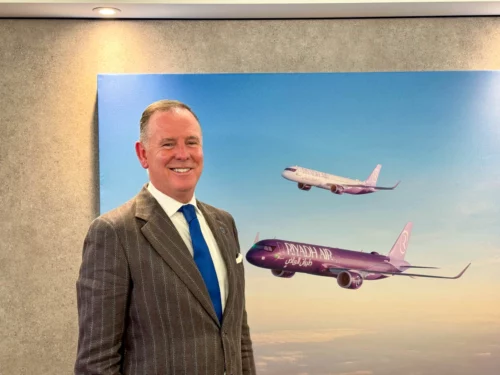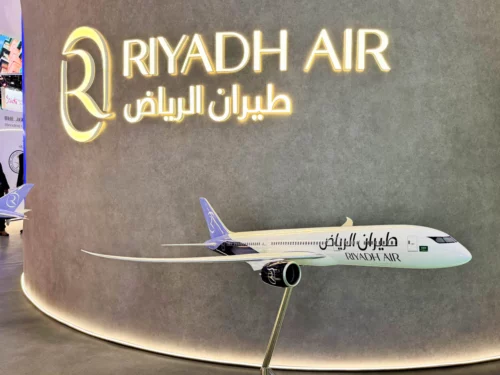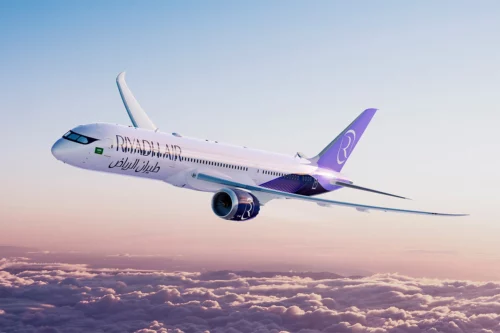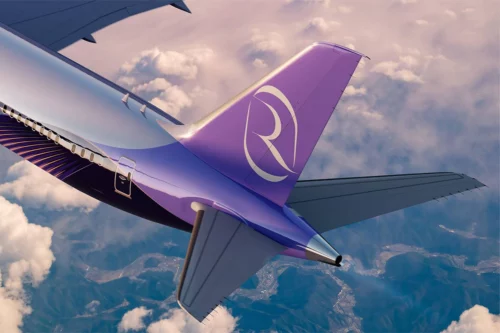We speak to Tony Douglas, CEO of Riyadh Air: “we have to be better” than Emirates, Qatar Airways
Links on Head for Points may support the site by paying a commission. See here for all partner links.
Riyadh Air hasn’t operated a single commercial flight, yet it’s one of the hottest airlines right now.
Airline start-ups come and go; we’ve written about a fair few of them on HfP. Riyadh Air is different.
Launched in March 2023, it has the full backing of the Crown Prince and Public Investment Fund of Saudi Arabia, giving it the financial and political heft to be taken seriously. “It’s the biggest startup since Emirates.”
And taken seriously it was. Whilst other airlines wait years for their orders to arrive, Riyadh Air has somehow – miraculously – jumped to the front of the queue. The airline has already secured near-term deliveries of some of the most popular and over-ordered aircraft available with 39 Boeing 787-9s and 60 Airbus A321neos. The first are due to arrive next year, enabling flights to begin at some point in the summer.
British-born CEO Tony Douglas – who defected from Etihad to take the helm of Riyadh Air – was in London this week at World Travel Market, one of the largest travel trade shows globally.
The airline was originally due to unveil the much-hyped business class cabin. This particular reveal has been postponed to give the customer experience teams time to finish the soft product. I suspect the airline will host a big-bang launch in Riyadh next year.
I spoke to Tony at a small roundtable at WTM. His remarks below are taken from our conversation, as well as from his speech at the Aviation Club on Wednesday.
Why does Riyadh need a home airline?
Saudi Arabia already has a flag carrier – Saudia. So why does it need another?
The key to understanding Riyadh Air’s ambitions is understanding Saudi Arabia’s demographics. Unlike its Gulf neighbours, Saudi has a local population of almost 37 million – almost four times that of the UAE and 13 times that of Qatar.
“We’re not trying to create a market that doesn’t exist.
Riyadh, the capital city of a G20 country, is not well enough connected. Today, you do not have the option to fly direct to Tokyo. You do not have the option to fly direct to Shanghai or Seoul or Sydney, and the list just goes on and on and on.
For a G20 country – and the second fastest growing economy within the G20 – not to have global connectivity is clearly not sustainable. So we’re not trying to create a market that doesn’t exist. We’re trying to actually serve a market that, at the moment, has to use the likes of Qatar Airways and Emirates as the means by which you can get to those destinations.
To put it into perspective, the population of the city of Riyadh alone is three and a half times more than the whole of the population of Qatar. So at the moment, I think the number one flow on Qatar Airways, on premium i.e. business or first is Saudi passport holders.”
Factor in the country’s ambitious plans for tourism grown under its Vision 2030 plans and it quickly becomes clear that the country and city are underserved. If you are wondering how to get to Saudi Arabia, “the honest answer at the moment is not as easy as it needs to be.”
Riyadh Air’s big aircraft orders
With impeccable timing, Riyadh Air announced an order for 60 Airbus A321neos last week which will complement the existing order for 39 Boeing 787-9 Dreamliners and 33 additional options.
The Airbus order was “almost a replay of the widebody campaign.”
“It’s a two horse race between Boeing and Airbus. When we did the widebody, it genuinely was a 51-49 split between A350-900 and the 787-9. It was a campaign that was analyzed in huge detail based upon our network and what our mission is, in terms of range, frequency, other conditions, what the performance comparison is, what the availability comparison is, and what the pricing comparison is. So there’s three principal parts of the campaign analytics, which is performance, availability and pricing.
On the widebody, the 787 was selected. In terms of the narrowbody, it was exactly the same three parameters. And on this one it was, in all honesty, a very, very tight profile.
We’re delighted, because we’re of the view that A321neo, as a family of aircraft, is a bit of a game changer when it comes to environmental performance, when it comes to the flexibility/versatility of it as an airframe. Because Airbus do the A321, they do the Long Range A321LR. And of course, the A321XLR which went into service last week for the first time with Iberia.”
Crucially, Riyadh Air has full flexibility to select any one of the numerous A321neo variants which are available:
“Now, because we’re not currently in the configuration window, what we’ve done is placed orders for 60 A321neo family of aircraft. So within the configuration window, we can elect to select any from that family as we see fit. And that’s another compelling reason why this aircraft was so interesting to us.
And I think the final one, which is normal doctrine in our line of business: if all other things remained equal, is you would always like to have a bit of a split between the two big manufacturers.”
For the A321neo fleet, Riyadh Air is looking at two configurations:
“We’re likely to have one which is for slightly shorter missions, which, by definition, is likely to have more seats, and we are likely to have a second layout plan for longer range deployments. And I believe that consistency with the product offering we’ve got would necessitate a lie-flat option on that.”
But Riyadh Air’s shopping spree doesn’t stop there. Having now secured a medium widebody and narrowbody order, it is turning its eyes to the large widebody market. It is a competition between the larger A350-1000 and the Boeing 777X family, the launch of which has been further delayed into 2026. It’s not clear how big this order will be.
Aircraft performance will be crucial: like its Gulf neighbours, Riyadh Air will operate in very hot conditions and at an altitude of around 600m, both of which impact the take-off performance of jet engines.
One question mark remains over the performance of the Rolls-Royce XWB-97 engines on the A350-1000, which Emirates CEO Tim Clarke has called out as “not doing what we want it to do.” I asked Tony if he was of the same mindset.
“The engine choice is almost more of the decision than the airframe choice. Now, the XWB is going through a whole series of upgrades that are scheduled to hit the market by 2028. Having said that they need to be seen to be believed, but that would be a crucial part of any decision. I operated the A350-1000 with Etihad where I brought them into service. An incredible machine, but the engine has to perform, and that’s the same as well with Boeing 777-9X because that’s an all new engine type as well.”
For the 777-9X in particular, which has yet to start commercial operations, the “technical evaluation criteria is hugely complex.” As we’ve seen with other engines recently, including on narrowbodies, whilst engines have been perfomring as promised they have not been as reliable or robust as hoped: cutting-edge, advanced materials have been pushed to their limits and not always delivered.
Riyadh Air’s loyalty program
One question I had for Tony was what Riyadh Air’s loyalty program might look like.
“We can take loyalty to the next level. And if you say loyalty, it obviously is more about lifestyle in this day and age. We’ve interviewed our [native Saudi] demographic, where average age is 29 and they are very digital.
Loyalty for them is anathema. What they’re looking for is instant gratification, and something closer to what the experience is in the world are gaming. So again, what we’re going to do with the loyalty side is actually got more of the connection in terms of how you would game, how you would message, than what the traditional loyalty program would look like.”
So …. will there be tier points or air miles?
“There will be a currency. And you can obviously trade that currency. Do you want to pay with your Apple Pay? Or do you actually want to use your currency.”
That makes it sound like more of a conventional loyalty scheme, although Tony did tout hyperpersonalisation as one of the pillars of Riyadh Air’s offering. It seems like we’ll have to wait for the formal launch to see what this means in practice. As you can tell, Tony is a master at hyping something up without giving a lot away ….
So, when can you fly Riyadh Air?
Next year. An official launch date has yet to be announced, but Riyadh Air plans to start commercial flights in summer 2025. Impressive for an airline that only launched in 2023.
The airline has completed the flying portion of its Air Operator Certificate: it expects the paperwork to be complete by early next year, potentially as early as January.
“So because we’ve completed that, we can get involved in the discussions with the different jurisdictions. Without the AOC, if I come to your airport or your Department of Transport, or your Civil Aviation Authority and say, ‘I’d like to fly to your city next summer or the following winter season’. The first thing they say is, ‘Well, lots of people bang on this door, but are you bona fide? And actually, have you got a certificate?’ So, we’ve now got that.”
Riyadh Air can now start dicussions with airports and governments to enable it to secure routes and slots. One challenge will be at slot constrained airports such as Paris Charles De Gaulle or London Heathrow.
“I wouldn’t overplay it, but the reality is, everybody wants a new startup, because most jurisdictions have what’s called new entrant rules. So if I’m an existing airline and I’ve already got six a day into your airport, and I turn up and say, ‘I want to go to seven’, and the new entrant turns up and says, ‘I actually just want to put my first one on’, most of them have what’s called the new entrant rule, which means you’re always front of the queue because you’re new entrant.”
The first route has yet to be announced, although it sounds like it could include both short and long haul flights, despite the limited number of aircraft Riyadh Air will have when it launches.
At least initially, Riyadh Air will be an all-widebody airline as it won’t receive its first A321neos until the second half of 2026.
“As an illustration: Let’s say it’s Riyadh to London. It then does London, back to Riyadh. We’ll probably then do a 90 minute turnaround and go to Dubai, back to Riyadh. It might then go to Frankfurt, come back, another 90 minute turnaround and then Delhi or Jeddah. So what we’ll be pairing is medium haul (Western Europe), with, by our standards, relatively shorter regional flights, just because it’s widebodies that we start with, and we want to drive the utilization up.”
Thank you to Tony and his team for their time. We will keep you updated as the Riyadh Air story develops.













Comments (94)